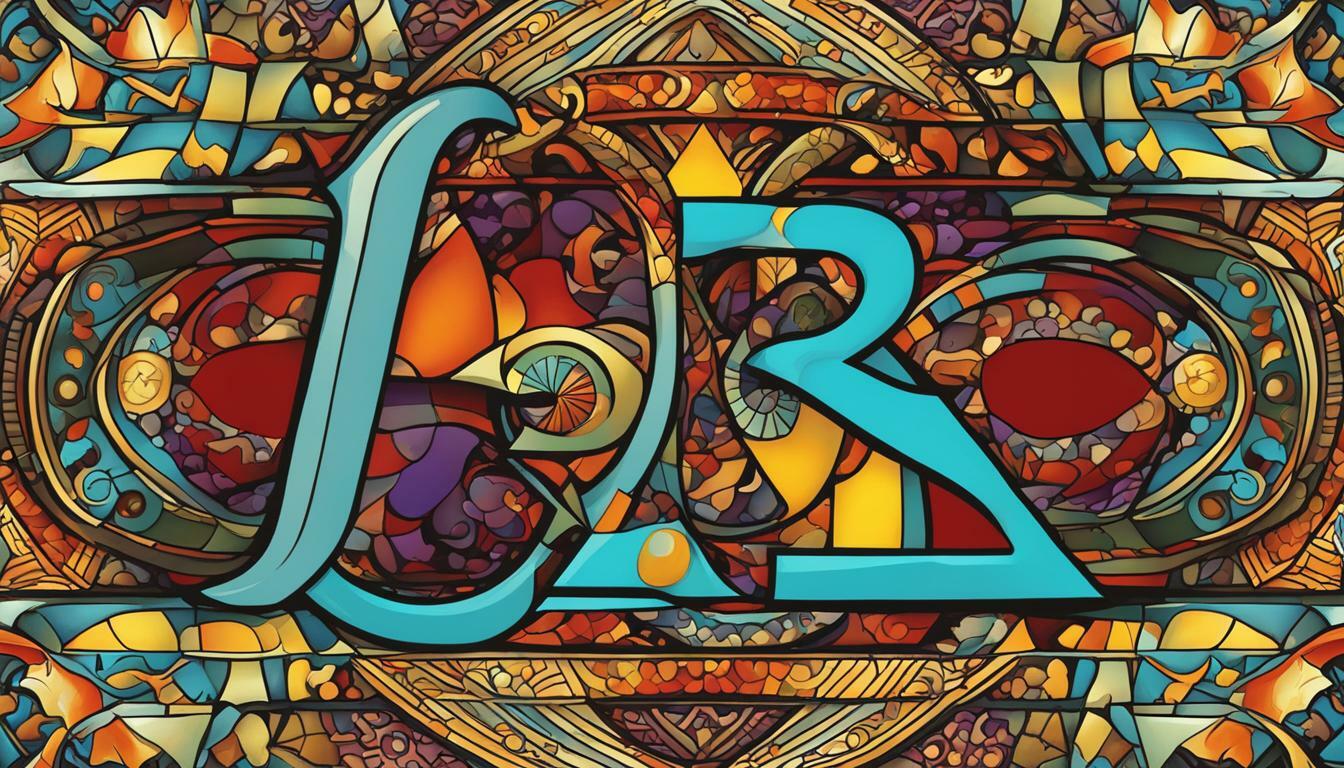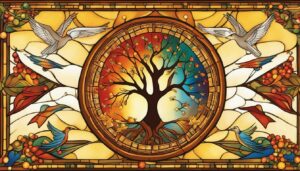The number 28 in the Bible holds various symbolic meanings that reveal insights into redemption, praise, obedience, and the divine presence. It is derived from the product of 7 (a perfect numeral) and 4. Throughout Scripture, the number 28 is intertwined with significant themes that carry deep spiritual significance.
One of the key symbolic associations of the number 28 is with redemption and reconciliation. This is seen through the phrase “the Lamb” referring to Jesus Christ, which occurs 28 times in the Bible. Each instance represents the ultimate act of redemption and reconciliation, highlighting the significance of this number in bringing humanity closer to God.
Praise and worship are also closely connected to the number 28 in the Bible. The word “Hallelujah” appears 28 times in Scripture, emphasizing the importance of praising God. This numerical symbolism underscores the significance of expressing gratitude and worship to the Almighty.
Furthermore, the number 28 is linked to God’s instructions for worship in the wilderness tabernacle. In Exodus 26:1, the measurements of the curtain for the tabernacle are described as being 28 cubits long. This highlights the divine guidance and instructions given for worship, emphasizing the sacredness and obedience required in approaching God.
Another meaningful association of the number 28 is with King David. He appears in twenty-eight books of the Bible, representing repentance and humility. The inclusion of King David in these texts signifies the importance of acknowledging our faults, seeking forgiveness, and approaching God with a humble heart.
Overall, the number 28 in the Bible carries symbolic significance that encompasses redemption, praise, obedience, and the divine presence. Its appearance in various contexts throughout Scripture invites us to delve deeper into these themes and find meaning in our spiritual journey.
The Redemption and Reconciliation Symbolism of Number 28
In the Bible, the number 28 symbolizes redemption and reconciliation, representing the profound significance of Jesus Christ’s sacrifice. This numeric symbolism is derived from the product of 7, a perfect numeral, and 4, symbolizing the earth’s elements. The phrase “the Lamb,” referring to Jesus Christ, occurs 28 times in Scripture, highlighting His role as the ultimate sacrifice for the redemption of humanity.
“Behold! The Lamb of God who takes away the sin of the world!” – John 1:29
Furthermore, the word “Hallelujah” appears 28 times in the Bible, signifying praise to God. This emphasizes the connection between the number 28 and expressions of worship and thanksgiving.
“Praise the Lord! For it is good to sing praises to our God; for it is pleasant, and a song of praise is fitting.” – Psalm 147:1
The number 28 is also associated with the measurements of the curtain for God’s wilderness tabernacle in Exodus 26:1. This reveals God’s divine instructions for worship, emphasizing the importance of obedience and reverence in approaching Him.
“You shall make the tabernacle with ten curtains of fine twined linen and blue and purple and scarlet yarns; you shall make them with cherubim skillfully worked into them.” – Exodus 26:1
Moreover, the number 28 is connected to King David, who appears in twenty-eight books of the Bible. This association represents repentance and humility, as David’s journey of self-reflection and reliance on God serves as a model for us all.
“Have mercy on me, O God, according to your steadfast love; According to your abundant mercy blot out my transgressions.” – Psalm 51:1
The Symbolism of Repentance and Humility in Number 28
The biblical significance of the number 28 encompasses redemption, praise, obedience, and the divine presence. It is a reminder of Jesus Christ’s sacrifice for the salvation of humanity, urging us to express our gratitude and worship God wholeheartedly. The connection to King David also encourages us to approach God with repentance, humility, and a willingness to seek His forgiveness.
The Significance of Praise and Worship in Number 28
The number 28 carries a symbolic meaning of praise and worship in the Bible, emphasizing the importance of acknowledging and glorifying God. This significance is seen through various biblical references that highlight the connection between the number 28 and acts of praising and worshiping the Almighty.
One such reference can be found in the book of Psalms, where Psalm 28:7 states, “The LORD is my strength and my shield; my heart trusts in him, and he helps me. My heart leaps for joy, and with my song I praise him.” Here, the number 28 serves as a reminder of the joy and gratitude expressed through worship and praise towards God.
In the words of King David, who is associated with the number 28, he declares in Psalm 95:1-2, “Come, let us sing for joy to the LORD; let us shout aloud to the Rock of our salvation. Let us come before him with thanksgiving and extol him with music and song.”
This passage emphasizes the significance of praising God through music and song, symbolized by the number 28. It reminds believers of the power of worship in expressing their love and adoration for the Divine.
The Biblical Meaning of Number 28: A Call to Worship
Moreover, the number 28 represents a call to worship and a reminder of God’s presence among His people. Exodus 28:12 describes the clothing of the high priest, stating, “Twelve stones correspond to the names of Israel’s sons. The names are engraved like a seal, each one for the twelve tribes.” This verse showcases the connection between the number 28 and the act of worship through the clothing of the high priest, symbolizing the importance of honoring and glorifying God.
In conclusion, the number 28 in the Bible holds a significant spiritual meaning related to praise and worship. It reminds believers of the importance of acknowledging God’s presence in their lives and expressing gratitude through acts of worship and praise. Through biblical references and passages, the number 28 serves as a reminder to continuously seek the presence of God and honor Him through genuine and heartfelt worship.
The Divine Instructions for Worship in Number 28
In Exodus 26:1, the measurements of the curtain for God’s wilderness tabernacle are given as 28 cubits, symbolizing God’s specific instructions for worship. This detail highlights the meticulousness and precision required in approaching worship. The number 28 represents a divine blueprint for how worship should be conducted, reflecting God’s desire for His people to approach Him with reverence and obedience.
Throughout the Bible, God provides instructions on how He should be worshiped, emphasizing the importance of purity, holiness, and sincerity in worship. The number 28 serves as a reminder of these divine instructions, calling believers to honor God with their whole hearts and to offer their worship in accordance with His revealed will.
“These are the things you are to do: Offer two lambs a year old as a burnt offering to the LORD each day for the regular burnt offering.” – Numbers 28:3
As seen in Numbers 28:3, the number 28 is directly associated with the instructions God gave to the Israelites regarding their daily offerings. By adhering to these instructions, the Israelites demonstrated their dedication and commitment to worshiping God in the way He desired.
Symbolic Significance
The number 28 holds a symbolic significance beyond its literal representation. It represents not only God’s specific instructions for worship but also His desire for a genuine and heartfelt worship from His people. It serves as a reminder that worship is not merely a ritual or tradition but a deeply spiritual act that requires obedience, humility, and gratitude.
In conclusion, the number 28 in the Bible carries considerable weight in terms of its symbolic meaning related to divine instructions for worship. It calls believers to approach worship with reverence, sincerity, and adherence to God’s revealed will. By understanding and embracing the significance of the number 28, believers can deepen their connection with God and experience a more profound and meaningful worship.
The Symbolism of Repentance and Humility in Number 28
King David appears in twenty-eight books of the Bible, symbolizing repentance and humility as he sought to align his life with God’s will. Throughout the scriptures, we see David’s journey of redemption and his acknowledgment of his own shortcomings. From his humble beginnings as a shepherd boy to his reign as the greatest king of Israel, David’s story serves as a reminder of the transformative power of repentance.
Repentance, in the biblical context, goes beyond mere remorse for one’s actions. It involves a deep turning away from sin and a sincere desire to live in accordance with God’s commandments. David’s heartfelt repentance after his affair with Bathsheba and the subsequent murder of her husband, Uriah, is a powerful example of his humility before God.
David’s repentance is beautifully expressed in Psalm 51, where he cries out to God, “Create in me a clean heart, O God, and renew a steadfast spirit within me.” This psalm serves as a testament to David’s recognition of his need for forgiveness and his sincere repentance. It is a poignant reminder that no matter the depths of our transgressions, God’s grace is always available to those who humble themselves before Him.
The Symbolism of Repentance and Humility in Number 28
Beyond David’s personal journey, the number 28 itself holds symbolic meaning in relation to repentance and humility. As previously mentioned, the number 28 represents the product of 7 (a perfect numeral) and 4. This multiplication signifies the combination of spiritual perfection (7) and earthly completeness (4). In the case of repentance and humility, this combination implies a complete surrender of oneself to God’s will and a transformation of the heart.
Just as David sought to align his life with God’s will, we too can find encouragement in the symbolism of the number 28. It serves as a reminder that no matter our past mistakes or shortcomings, God is always ready to forgive and restore us. Through repentance and humility, we can experience a deep connection with the divine and a transformation of our lives.
So as we consider the symbolic significance of the number 28 in the Bible, let us be reminded of the power of repentance and humility. May we follow in the footsteps of King David, seeking God’s forgiveness, and embracing a life of obedience and surrender. In doing so, we can experience the transformative grace and mercy of our loving Creator.
FAQ
Q: What does the number 28 symbolize in the Bible?
A: The number 28 holds various symbolic meanings in the Bible, representing redemption, praise, obedience, and the divine presence.
Q: How is the number 28 associated with redemption and reconciliation?
A: The phrase “the Lamb,” referring to Jesus Christ, occurs 28 times in Scripture, symbolizing redemption and reconciliation.
Q: What is the significance of the word “Hallelujah” appearing twenty-eight times?
A: The word “Hallelujah” appearing twenty-eight times signifies praise to God.
Q: How is the number 28 connected to God’s instructions for worship?
A: The number 28 is associated with the curtain measurements for God’s wilderness tabernacle in Exodus 26:1, representing God’s instructions for worship.
Q: What does the number 28 symbolize in relation to King David?
A: King David appears in twenty-eight books of the Bible, symbolizing repentance and humility.




